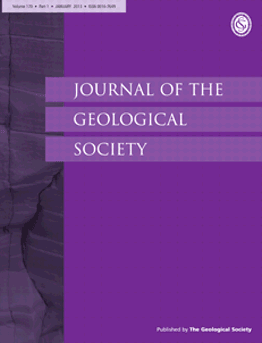
JOURNAL OF THE GEOLOGICAL SOCIETY
Scope & Guideline
Empowering Geoscientists with High-Impact Research
Introduction
Aims and Scopes
- Tectonic and Structural Geology:
The journal publishes research on tectonic processes, structural analyses, and the evolution of geological structures over time, including the implications for mountain building, faulting, and sedimentation. - Sedimentology and Stratigraphy:
A significant focus is on sedimentary processes, facies analysis, and stratigraphic frameworks, often exploring the interactions between sedimentation and tectonics in various geological settings. - Paleoclimate and Paleoenvironmental Studies:
Research addressing past climatic conditions and their impact on geological formations is prominent, including studies on biotic responses to climatic changes and sedimentary environments. - Geochemistry and Petrology:
The journal features studies on the geochemical processes involved in rock formation, alteration, and the evolution of magmatic systems, contributing to the understanding of mineral resources and volcanic activity. - Geochronology and Dating Techniques:
There is a strong emphasis on the application of geochronological methods (e.g., U-Pb dating) to constrain the timing of geological events, which is crucial for unraveling Earth's history. - Geological Hazards and Risk Assessment:
The journal also addresses issues related to geological hazards, including seismic risk, landslides, and their implications for engineering and land use planning.
Trending and Emerging
- Climate Change and Geological Impacts:
There is an increasing number of studies examining the geological implications of climate change, including sedimentary responses and past climate events, reflecting a growing awareness of geological research's relevance to contemporary issues. - Geological Data Integration and Modelling:
The use of advanced data integration techniques, including GIS and 3D modelling, has gained traction, indicating a trend towards more sophisticated methods in geological analysis. - Geodynamics and Continental Evolution:
Research on the dynamics of continental evolution, including plate tectonics and the interactions between crustal blocks, is becoming more prominent as scientists seek to understand Earth's ongoing geological processes. - Environmental Geoscience:
Studies addressing the intersection of geology with environmental issues, such as resource management, geological hazards, and sustainability practices, are increasingly featured, highlighting the journal's responsiveness to global challenges. - Technological Advances in Geological Research:
There is a noticeable trend in the application of new technologies, such as machine learning and remote sensing, in geological studies, reflecting the journal's adaptation to modern research methodologies.
Declining or Waning
- Volcanology:
Although still relevant, the focus on volcanic processes and products appears to have waned compared to the robust discussions on tectonics and sedimentology. - Biostratigraphy:
Research centered on biostratigraphic frameworks has decreased, likely due to the journal's current emphasis on broader geological processes rather than specific fossil-based correlations. - Geological Mapping Techniques:
There seems to be a reduction in studies primarily focused on traditional geological mapping techniques, with a shift towards more integrated approaches that combine various methodologies. - Hydrogeology and Groundwater Studies:
Research on hydrogeology and groundwater issues has become less prominent, possibly overshadowed by more pressing topics like climate change impacts and tectonic studies.
Similar Journals
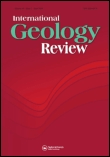
INTERNATIONAL GEOLOGY REVIEW
Advancing geological knowledge for a sustainable future.INTERNATIONAL GEOLOGY REVIEW, published by Taylor & Francis Inc, is a premier journal dedicated to advancing the field of geology since its inception in 1959. With its Q1 ranking in the field of Geology for 2023, this journal is a significant platform for researchers, professionals, and students exploring the intricacies of Earth and planetary sciences. The journal has been rated in the 81st percentile within Scopus rankings, reflecting its influence and the high quality of articles published. Although it does not offer Open Access options, the journal maintains a rigorous peer-review process to ensure the publication of original and impactful research. With an extensive archive projected to continue until 2024, INTERNATIONAL GEOLOGY REVIEW serves as an essential resource for those seeking to deepen their understanding of geological phenomena, making it a vital contributor to the global scientific community.

JOURNAL OF THE GEOLOGICAL SOCIETY OF INDIA
Exploring the depths of Earth's mysteries.JOURNAL OF THE GEOLOGICAL SOCIETY OF INDIA, published by Springer India, serves as a pivotal platform for researchers and practitioners in the field of geology. Established in 1979, this journal has been instrumental in advancing geological research throughout India, showcasing both regional studies and cutting-edge global research. With its Category Quartile ranking of Q3 in the geology category for 2023, and a significant Scopus rank of 171 among 321 journals in Earth and Planetary Sciences, it remains a respected source of scholarly activity. The journal is dedicated to the dissemination of original research articles, reviews, and case studies that encapsulate the dynamic scope of geological science, thus contributing to the understanding of geological phenomena. Although currently not offering open access, the journal maintains a commitment to high-quality scholarship and aims to engage a diverse readership, enhancing the knowledge and practice of geology across various disciplines.
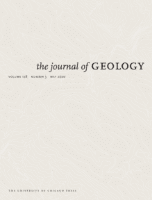
JOURNAL OF GEOLOGY
Connecting Scholars to the Heart of Earth Sciences.The JOURNAL OF GEOLOGY, published by University of Chicago Press, serves as a premier platform for disseminating groundbreaking research in the field of geology. Established in 1973, this esteemed journal has consistently ranked in the Q2 category in geology, further solidified by its Scopus ranking, where it is positioned at 99 out of 321 in Earth and Planetary Sciences, marking it in the 69th percentile of its category. With an emphasis on innovative and interdisciplinary studies, the journal features peer-reviewed articles that contribute to the understanding of geological processes, earth materials, and environmental interactions. Although it does not currently offer open access, it facilitates broad access through academic institutions to reach a global audience of researchers, professionals, and students striving to advance the knowledge of Earth's history and dynamics. As a vital resource for the geology community, the JOURNAL OF GEOLOGY plays an essential role in fostering scholarly dialogue and advancing both academic inquiry and practical applications in geology.
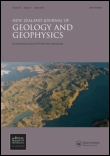
NEW ZEALAND JOURNAL OF GEOLOGY AND GEOPHYSICS
Advancing Knowledge in Geology and Geophysics.NEW ZEALAND JOURNAL OF GEOLOGY AND GEOPHYSICS, published by Taylor & Francis Ltd, stands as a prominent forum dedicated to the interdisciplinary exploration of geological and geophysical phenomena. With an impact factor that situates this journal in the prestigious Q1 category across key subjects—namely Earth and Planetary Sciences, Geology, and Geophysics—it is a critical resource for researchers, professionals, and students alike. The journal has been operational since 1958 and continues to contribute valuable insights into the complexities of the Earth's processes. Although it does not currently offer Open Access options, its broad readership benefits from an extensive archive of high-quality research findings that span from 1958 to 2024. Located in the United Kingdom, the journal remains a pivotal player in advancing the understanding of Earth's systems, making significant contributions to both academic inquiry and practical applications in the field.
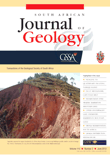
SOUTH AFRICAN JOURNAL OF GEOLOGY
Exploring South Africa's geological treasures.The South African Journal of Geology (ISSN: 1012-0750, E-ISSN: 1996-8590) is a prestigious academic journal published by the Geological Society of South Africa, dedicated to advancing research and knowledge in the field of geology. Established in 1987, this journal has become a cornerstone for geoscientists, featuring a diverse range of studies that address key geological phenomena, particularly within the South African context. With its current quartile ranking of Q2 and an impressive Scopus rank placing it in the 70th percentile among Earth and Planetary Sciences, the journal is recognized for its significant contribution to the discipline. As researchers and professionals across the globe seek to explore and understand geological processes, the South African Journal of Geology stands out as an essential resource, fostering collaboration and innovation in geoscientific research.

Gondwana Research
Exploring the Depths of Gondwana's Geological LegacyGondwana Research is a premier academic journal published by Elsevier, specializing in the field of geology, with a robust focus on the geological history and processes of the Gondwana supercontinent. With an impressive impact factor and ranking as Q1 in the 2023 Geology category, it stands as a leading platform for disseminating high-quality research. The journal features articles that advance the understanding of Earth and planetary sciences, making significant contributions to geological education and research. Researchers will find its curated content particularly valuable, as it encompasses a wide array of topics including stratigraphy, paleontology, and tectonics, all relevant to both contemporary and historical geological inquiries. Given its substantial reach and esteemed standing—ranked 5th out of 321 in its field—Gondwana Research plays a crucial role in fostering scientific exchange among global experts. Located in the United States with publication continuity from 1997 to 2024, this journal consistently attracts submissions from leading scientists, ensuring that its readership is kept at the forefront of geological discovery and innovation.
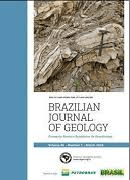
Brazilian Journal of Geology
Exploring the Depths of Earth ScienceBrazilian Journal of Geology, the flagship publication of the SOC BRASILEIRA GEOLOGIA, has been a beacon of geoscientific research since its inception in 2013. With an ISSN of 2317-4889 and an E-ISSN of 2317-4692, this open-access journal has facilitated the dissemination of high-quality research across various branches of geosciences, making it freely accessible to a global audience since 2014. Hailing from Brazil, the journal proudly holds a Q2 ranking in Earth and Planetary Sciences as of 2023, and ranks #73 out of 195 in Scopus, indicating its growing impact and relevance in the field. The Brazilian Journal of Geology aims to bridge diverse geological studies with interdisciplinary approaches, promoting the understanding and application of geology in addressing contemporary scientific challenges. As it converges research from 2013 to 2024, the journal not only enriches the academic landscape but also serves as a vital resource for researchers, professionals, and students eager to explore the complexities of the Earth and its processes.

BASIN RESEARCH
Fostering Innovation in Geological ResearchBasin Research, published by Wiley, is a leading journal in the field of Geology, with a distinguished reputation affirmed by its Q1 ranking in the 2023 category of Earth and Planetary Sciences. Since its inception in 1988, the journal has been at the forefront of fundamental and applied research surrounding sedimentary basins, delving into their evolution, architecture, and dynamics. With an impressive Scopus rank of #36 out of 321, placing it in the 88th percentile, Basin Research serves as a critical platform for researchers, professionals, and students engaged in advancing our understanding of geological processes and their implications for natural resources and environmental policies. The journal is accessible to a global audience and emphasizes high-quality, peer-reviewed articles that cover a diverse array of topics from basin analysis to sedimentology and beyond. For those interested in deepening their insights into this vital area of study, Basin Research stands as an invaluable resource in the academic landscape.
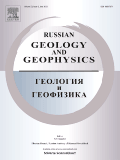
Russian Geology and Geophysics
Elevating Research Standards in Geology and GeophysicsRussian Geology and Geophysics is a seminal journal published by GEOSCIENCEWORLD that plays a pivotal role in the dissemination of vital research within the realms of Earth-Surface Processes, Geology, and Geophysics. With an ISSN of 1068-7971 and an E-ISSN of 1878-030X, this journal has witnessed a continuous evolution since its convergence in 2007 and is poised to thrive through 2024. While it is not an Open Access journal, it is recognized for its significant contributions to the academic community, holding a respectable Q2 ranking in Earth-Surface Processes and Q3 rankings in both Geology and Geophysics as of 2023. The journal’s impact factors align it within competitive quartiles, marking it as an essential resource for researchers and professionals seeking to stay at the forefront of geological and geophysical sciences. By publishing high-quality peer-reviewed articles, the journal fosters an environment of knowledge sharing and innovation, making it indispensable for students, practitioners, and scholars alike who are dedicated to advancing our understanding of Earth's complex systems.

GEOLOGICA ACTA
Advancing geological knowledge for a sustainable future.GEOLOGICA ACTA is a distinguished open-access journal dedicated to the field of geology, published by Universitat de Barcelona since its inception in 2003. With an impact factor that reflects its relevance in the academic community and a commendable Q2 ranking within the Earth and Planetary Sciences category, this journal is committed to disseminating high-quality research that spans various aspects of geological sciences. The journal's broad scope encompasses both theoretical and applied research, making it a vital platform for researchers, professionals, and students alike to share their findings with a global audience. With its Open Access policy, GEOLOGICA ACTA ensures that all published articles are freely accessible, fostering collaboration and innovation in the geological community. Based in Barcelona, Spain, at the Geociences Barcelona (CSIC), it plays a pivotal role in connecting scholars from diverse backgrounds and advancing the field of geology through rigorous peer-reviewed articles.